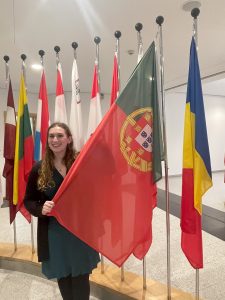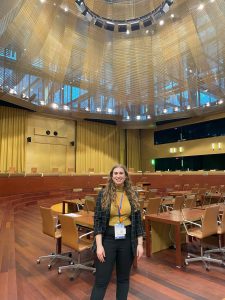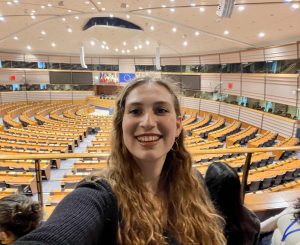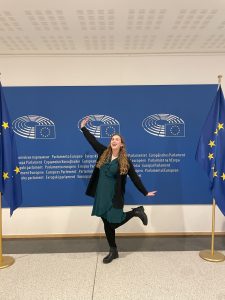
“EU-NATO Summit Reflection” by Michelle Furmansky

«Just over a week ago, I had the privilege to attend the Fulbright EU-NATO Seminar in Luxembourg and Brussels. In the span of four days, I learned about these institutions with a depth and clarity I could not have found anywhere else, and gained a deeper understanding of the U.S. relationship with both the EU and NATO in the process. Coming into the seminar, I will admit that my knowledge of all of the European Union’s institutions and NATO were more surface level. Through university classes and exposure to a select few EU laws during my research here in Lisbon, I knew the basic functions and mechanics of both organizations. Yet with each new lecture and seminar at this conference, my perspective on these bodies gained more nuance and complexity, which will affect my research and my personal understanding of the complicated dynamics of European and transatlantic politics.

We began the week with a reception at the U.S. Embassy to Luxembourg, during which we heard from both the U.S. Ambassador to Luxembourg and the Prime Minister of Luxembourg (himself a Fulbright alumnus)! I have never heard the head of state of another country speak so personally before in my presence, so his entire speech was an incredible experience. He described at length as to how his experience as a Fulbrighter lent him a multicultural perspective and granted him a more concrete opportunity to view his country through the global lens, which I fully relate to through my own experiences with the program. While in Luxembourg, I learned that (as of 2021), around 14.5% of Luxembourg’s population were actually Portuguese! While in Luxembourg, I spoke with a few locals and those in the embassy about this unique phenomenon, and I will be incorporating this particular migration into my research on youth unemployment in Portugal and Portuguese youth leaving Portugal in search of higher paying jobs.

On the following day, we went to the European Court of Justice and met with a judge who also happened to be a Fulbright alumnus! We were able to listen to a real hearing in front of a panel of judges about a discrepancy between an EU directive and its Italian interpretation regarding the financial compensation of the families of murder victims. As someone who has a strong interest in law and is considering pursuing law school in the future, listening to this case was so insightful to the European legal process. I found striking similarities between how the judges conducted questioning of the parties and how the U.S. Supreme Court does the same in the United States, and the case itself turned out to be a unique debate over who can be considered a victim of a murder crime. Personally, this was one of the highlights of the seminar for me, and hearing things be live-translated through our ear pieces made me feel like a real diplomat! Finally, we listened to a lecture by the President of the European Court of Justice about the ECJ’s role in the EU institutional system and about the many similarities and interactions between the ECJ and the U.S. Supreme Court, and then finished with lunch with some of the judges before heading to Brussels.

While in Brussels, we listened to lectures from a series of speakers at both the European Parliament and the European Commission. It was fascinating to compare the European party system and leadership structure with the U.S. one, and to see the physical chambers themselves. One of the speakers at the EU Commission focused his lecture on the economic policies of the EU, with an emphasis on the green economy, which was extremely helpful for my research. I came away from this lecture with a notebook full of new resources, databases, and research papers to dig through for my research, and I was exposed to a larger scale perspective of the EU’s green investment efforts that I have already been examining on a micro scale here in Portugal. The knowledge I’ve gained from the visit to the European Commission will be invaluable for my future research.

The seminar concluded with a visit to NATO headquarters. I was most excited for this portion of the seminar, as being granted access to NATO headquarters is a rare and prestigious opportunity. After a lengthy security screening, we heard from a series of speakers detailing everything from the history of NATO, its current policies and trajectory responding to the threat of Russia towards Europe, NATO’s non-lethal assistance efforts in Ukraine (particularly the medical side), and NATO’s plan for military capacity building over the next 20 years. Unlike my decent base of understanding of various EU institutions through my research in Portugal, the same could not have been said for NATO as it is outside of my research area. However, I learned so much about NATO’s role in the current conflict in Ukraine and how different members share the burden of responsibility for this organization. To me, it seems like many Americans (myself formerly included) only know of NATO or interact with it in an abstract sense, with no real connection to its role or importance as an institution on our lives back home. Visiting the headquarters helped me contextualize NATO’s role in modern geopolitical and military conflicts and the U.S.’s role as a founding member of NATO. To finish the visit off, we had the unique opportunity to meet with the U.S. Ambassador to NATO, who answered all of our policy questions with immense precision and gave wonderful advice about navigating diplomatic and military spaces as a woman, which I took to heart.

Overall, I want to thank the Portuguese Fulbright Commission for nominating me as their representative to the Seminar. What I’ve learned over the course of those four days will impact the depth and scope of my future research while on the grant and contribute to my ability to educate others on these institutions and become a sort of ambassador of them abroad. I now feel more comfortable in my understanding of the EU and NATO, and can be a more active citizen of the world, with a more complete knowledge of where I, as an American living in Portugal, fit into the complexity of it all. »